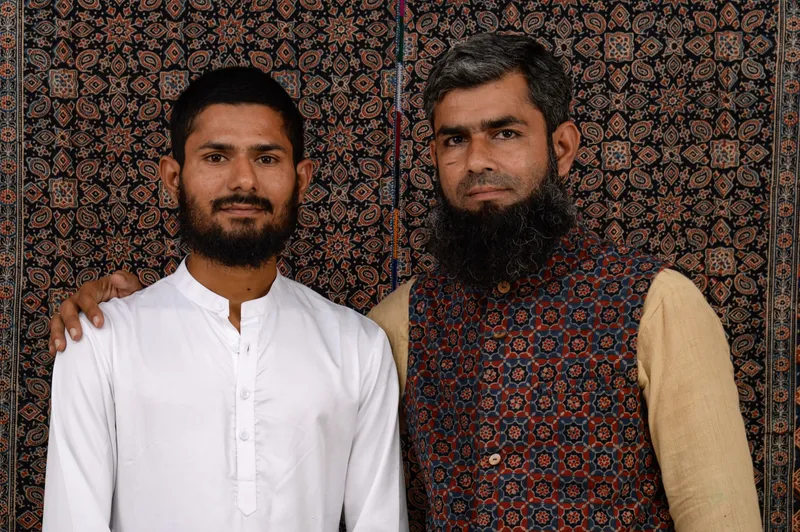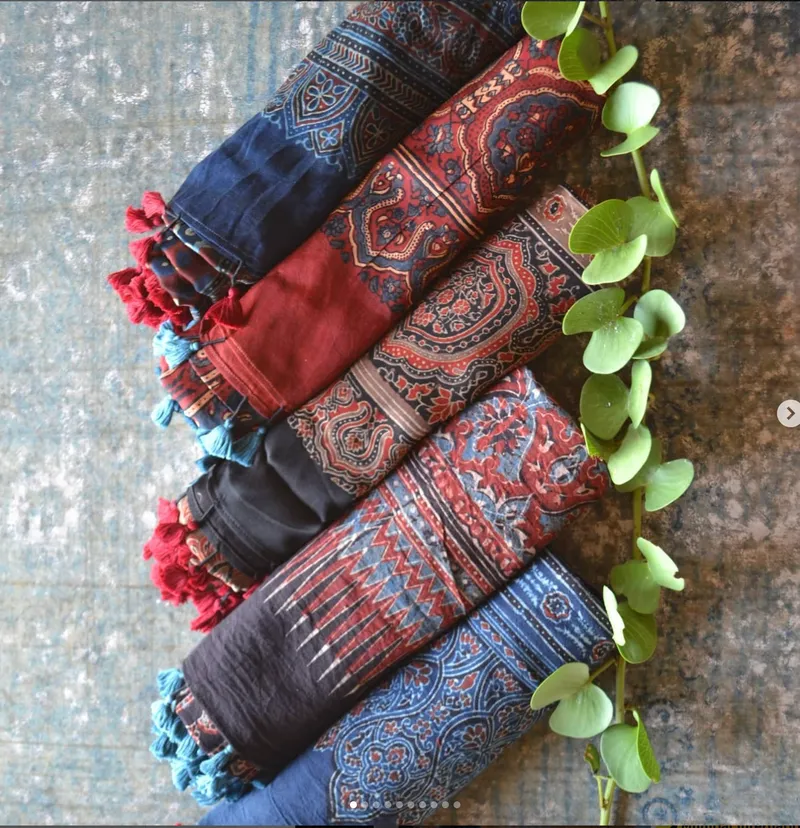Uncle-nephew duo Jabbar & Mubin want to take ajrakh craft to the world
Jabbar Khatri, and his nephew, Mubin, hail from a family of ajrakh artisans from Dhamadka in Kutch, Gujarat. Together, they run Jabbar & Mubin, a brand that aims to make ajrakh popular globally.
Growing up in Dhamadka—an artisan village in Kutch, Gujarat—Jabbar Khatri was introduced to his family’s traditional craft of ajrakh printing at a young age.
He recalls visiting other artisans’ workshops after school to learn from them. Like others in the village, Khatri’s family thought the young boys would learn better from other families than their own.

Mubin and Jabbar Khatri
“Everyone in my mother’s and father’s family was engaged in ajrakh hand block printing. It ran from one generation to another and can be traced back to 400 years, when a group of Muslim Khatris migrated from Sind to Dhamadka to settle here,” 42-year-old Khatri tells SocialStory.
In 2001, the Gujarat earthquake had a devastating effect on the handicraft industry. Khatri felt his work was not getting the market, money, or recognition it deserved.
“I moved to Mumbai to work in Alfa, a chain of shops selling mobile phones. I learned all about software systems and how to sell and spent two years living in the city,” he says.
However, he kept falling ill often. This—coupled with the high cost of managing a family in Mumbai—led Khatri back to his village. Even then, going back to his traditional craft was not his first decision.
He joined an aluminium plant and learned about production, quality, and dispatch. After a couple of years, he left to trade in industrial goods. But the itch to go back to his traditional crafts was always there.
He noticed design students from NIFT and other institutes flocked to the village to learn more about ajrakh and how to incorporate it into their designs and collections.
“In 2010, I had this gut feeling that online selling would become huge. When I discussed this with a close friend, he didn’t agree. But, in 2013, I could see it would soon become a reality,” he says.
Finding a niche online

Ajrakh designs
At the time, his nephew, Mubin, had completed a designing course in Kala Raksha—a social enterprise dedicated to preserving traditional crafts. Mubin’s designs were innovative, but he struggled to find a market.
Meanwhile, Khatri—steadfast in his belief that the online route would work—began sending cold emails to handicrafts stores and marketplaces but did not receive much of a response.
“I thought, why not try Facebook? Around 2014-15, I posted photos of a saree collection and received immediate responses, translating into sales,” he adds.
Jabbar and Mubin began participating in exhibitions, starting with the Dastakar Mela in New Dehli, where he met Nilesh Priyadarshi, Founder of Kaarigar Clinic and Pabiben.com. He would later help the duo create their brand, Jabbar & Mubin.
Priyadarshi helped them understand the markets, brand identity, designing, and how to innovate with a traditional craft like ajrakh.
The duo soon started work on designs on different kinds of fabric—tussar by wool and cotton by tussar as sarees, stoles, and dupattas with a focus on the highest quality.
Khatri says his brand was also committed to employing as many people as possible. At present, it employs 200 women for different aspects of production, with the workshop located in Dhamadka.
The venture has employed around 300 women resellers to sell their products. They, in turn, have completed close to a thousand orders. It also recently completed a consignment order for Europe, Khatri says.
The brand has an artisan profile on pabiben.com, Okhai, and other marketplaces. It supplies several big companies, including Taneira, FabIndia, etc. Recently, it added Aari work (a type of embroidery) to its body of work.
“We are innovating with ajrakh motifs for a fashion show in Uzbekistan, which became very popular. We understood that people prefer the traditional with innovative patterns. I always try to innovate the designs so that Jabbar & Mubin stands out as a brand. We are happy when celebrities sport our brand,” Mubin says.
Mubin, the 32-year-old, who has been working with ajrakh for the past 18 years, is excited about the imminent launch of Jabbar & Mubin’s e-store in six months.
According to Khatri, social media and ecommerce have played a huge role in eliminating middlemen by connecting kaarigars to customers seamlessly.
“India’s craft must not just be celebrated outside the country. They should be bought in India, and the tradition must go on,” he says.
Edited by Suman Singh






